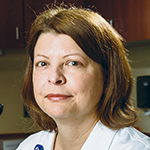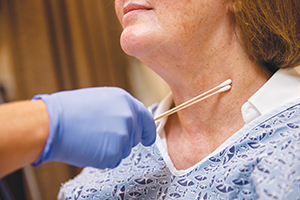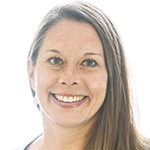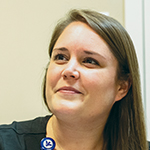System supports justice and safe harbor for people injured by sexual and physical abuse, human bondage
By JULIE MINDA
During a recent workday at Bon Secours St. Mary's Hospital in Richmond, Virginia, Bonnie Price was again reminded of the vital impact the hospital's patient advocates and forensic nurse examiners can have on the lives of patients who have been violently
assaulted. A former patient brought a bouquet of flowers for those teams and told Price, who heads the forensic nurse examiner program, that they had saved her life. The woman said they had given her the strength to speak up for herself and to leave
her boyfriend who was abusing her, and she was forever grateful to them.

Price
Price, who is administrative director for community health advocacy for Bon Secours Richmond, said that about a year ago, the patient was treated at the St. Mary's emergency department after her boyfriend had strangled her and punched her repeatedly.
She had a black eye and swollen face, bruises and skin breaks at over 45 different places on her body as well as a neck injury. Although attempted strangulation may leave no visible marks, Price said victims who are strangled are 750 times more likely
to be killed by their abuser.
The triage nurse summoned a victim advocate and a forensic nurse, both of whom were on-site. The advocate and forensic nurse took the woman to a private area designated for forensic exams.

A forensic nurse with Bon Secours St. Mary's Hospital in Richmond, Virginia, demonstrates with a mock patient a protocol for checking throat injury during an evaluation of a victim of violence. The Bon Secours Richmond system employs patient advocates
who team with its forensic nurses to aid assault victims.
When a victim of sexual assault or domestic violence arrives at a Bon Secours Richmond facility for emergency care, an advocate experienced in trauma-informed care offers to stay with her during a forensic exam and to connect her to social and legal services
afterwards. As the forensic nurse conducts her exam and the patient recounts details of the assault, the advocate provides emotional support and begins assessing what resources the patient may need when he or she is released from the hospital.
In this case, the advocate stayed with the patient in the forensic exam area as the patient talked with a police officer, who obtained a protective order for her. The advocate told the woman how to contact a rape crisis–domestic violence resource center
that could provide her with a safe place to stay that day.
Whether patients are admitted or discharged, the advocates remain in ongoing contact with them, linking them to organizations providing domestic violence counseling and services. The advocates also can connect them with organizations providing food, shelter,
transportation and child care. They can help patients or the guardians of minors who are victims of abuse navigate child protective services.
The patient stayed with a friend until her assailant was arrested and she has remained safe since. She got counseling. Her assault case is currently in the court system.
The woman, who wishes to remain anonymous, is one of about 1,200 victims of violence who have received trauma-informed support and/or service referrals through the Bon Secours Hospital Violence Intervention Program.
All patients of Bon Secours Richmond — which includes seven hospitals and three free-standing emergency departments — are asked about their personal safety. The forensic nurse and patient advocate teams are alerted when someone says they've been the victim
of violence. These nurses and advocates are based at St. Mary's and at Bon Secours Richmond's Southside Medical Center but can provide services at any Bon Secours Richmond site.
Violence reduction
For about 30 years, Bon Secours Richmond has been building up its programming to support sexual assault victims. The victims of violence advocacy program is the most recent addition to its comprehensive services
for victims.
Bon Secours Richmond hired five patient advocates for victims of violence in 2020 and is preparing to hire a sixth. All have experience in supporting domestic violence victims; most are social workers.

Gilmore
The goal of the patient advocacy program is to reduce interpersonal and community violence and related rehospitalizations, said program manager Beth Gilmore. To achieve this, Bon Secours Richmond provides comprehensive aid to individual survivors of sexual
and domestic violence and human trafficking. The advocates coach victims in obtaining protective orders and they advise, assist and often accompany those individuals who press criminal complaints through the legal system.
About 63% of all of the patients seen by the advocates and forensic nurses report physical assault, and of those, 27% report being strangled. Most of the violence intervention team's patients are sexual abuse victims. Recently the advocacy program expanded
the service to include victims of elder and child abuse.
In shock
Amy Callahan interned with St. Mary's forensic nurse program and completed a master's degree in social work and has since focused on working with victims of domestic violence and sexual assault. She is one of Bon Secours
Richmond's advocates.

Callahan
She says because of the way trauma impacts the brain, victims may be in shock, numb, and feel overwhelmed and anxious. The path to safety and recovery from domestic or intimate partner abuse is not linear, says Callahan.
"They may not be in a place where they are ready to leave their abuser, or that they recognize the level of danger they are in, or that they are ready to take the next steps to safety," says Callahan. "My role is to guide them through their response and
help educate them but to be realistic and respect their choices."
Gilmore says sexual and domestic violence have increased during the pandemic. People were isolated with their abusers, stress levels were way up and violence victims could not always access resources because of shut-down services. "There was more fear,
and they absolutely felt they had no way to get out."
The public interest
Gilmore says the total budget for the Bon Secours Hospital Violence Intervention Program that houses the advocates is between $650,000 and $700,000 annually.
Initial funding in December 2019 came from the Virginia Hospital and Healthcare Association and the Virginia Department of Criminal Justice Services, which targeted grant money to hospitals like St. Mary's that treat high numbers of violence victims.
The state said in a press release on the grants that across the nation, the violence intervention model that it was promoting through the grants "has proven to be a successful strategy in reducing community violence and related rehospitalizations."
While that first grant has ended, Bon Secours Richmond has successfully secured new grants. This includes fresh funding that began in July from Virginia's Department of Criminal Justice Victims Services grant program, with dollars secured through the
Federal Victims of Crime Act.
The violence intervention program also receives funding from philanthropy. The Bon Secours Mercy Health Foundation Mission Outreach Program is funding the salary of one of the patient advocates for a year.
Solid foundation
Bon Secours has had a forensic nurse program in place for nearly 30 years and Price is considered a foremost expert in the field of forensic nursing.
Prior to establishing the grant-funded programming, St. Mary's had volunteers in place to support sexual assault victims. Although they were trained in victim assistance, their ability to assess, address and follow up on socioeconomic needs was very limited
compared to that of a social worker. And the hospital couldn't ensure a volunteer would be in the hospital when a victim required immediate aid. The staff advocates provide a much higher level of service and expertise to the victims of violence.
Callahan says the patient advocates and the forensic nurses "are a united force – we're doing the best we can to stop the cycle of violence."
She adds that when domestic violence and sexual violence victims are ready to accept advocates' backing, and the assistance from partner organizations, "that is so important for their long-term healing and for them trying to move on to their new life
as a survivor of violence."